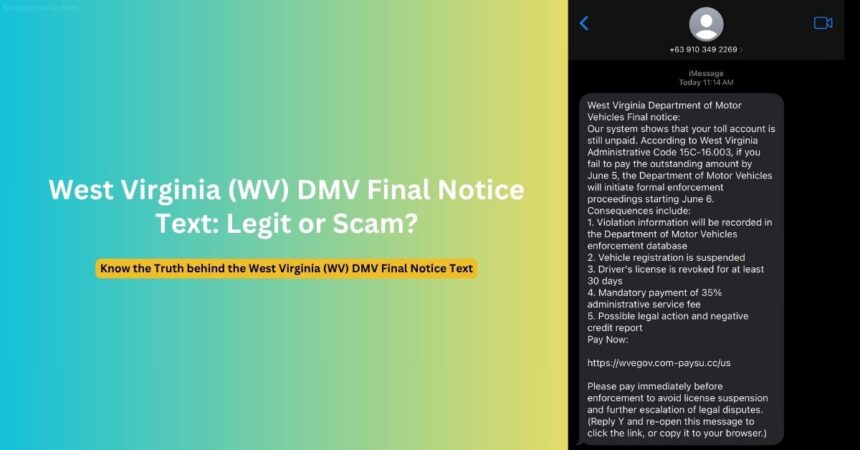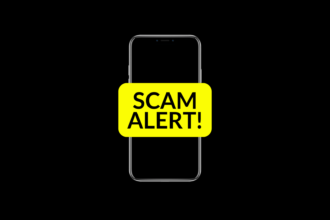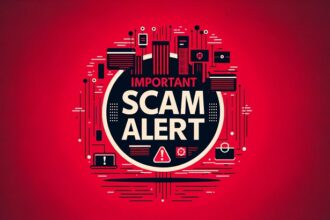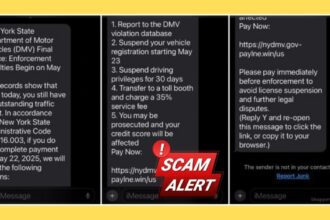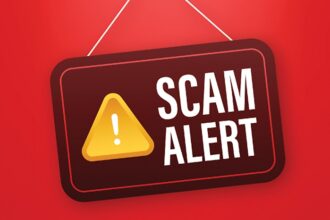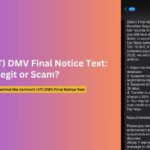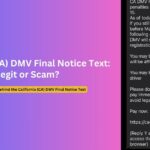A sophisticated text message scam targeting West Virginia residents has erupted across the Mountain State, with cybercriminals impersonating the West Virginia Department of Motor Vehicles (DMV) to steal personal and financial information. Thousands of West Virginians from Charleston to Martinsburg have received fraudulent “final notice” messages about alleged unpaid toll accounts and traffic violations, prompting immediate warnings from state law enforcement and government agencies.
Overview of the West Virginia (WV) DMV Text Scam
The West Virginia DMV Final Notice Text Scam represents a targeted cyber attack specifically designed to exploit West Virginia residents through fraudulent text messages claiming to be official communications from the West Virginia Department of Motor Vehicles. This sophisticated phishing operation has rapidly spread across all 55 West Virginia counties, affecting communities from the Ohio River Valley to the Eastern Panhandle.
The scam particularly exploits West Virginians’ familiarity with toll roads and bridges, referencing unpaid toll accounts alongside traditional DMV violations. Fraudsters create artificial urgency through threatening language about license revocation, vehicle registration suspension, and legal action to pressure victims into providing sensitive personal and financial information through malicious websites designed to appear as legitimate government portals.
West Virginia State Police and DMV officials emphasize categorically: The West Virginia Department of Motor Vehicles does not send unsolicited text messages regarding traffic violations, toll account balances, outstanding fines, or enforcement actions. All such communications are fraudulent attempts designed to steal personal information and commit financial crimes.
Impact Scope Across West Virginia
The West Virginia DMV traffic tickets text scam has affected:
- Residents across all West Virginia counties from Monongalia to McDowell
- Commuters using West Virginia Turnpike and other toll facilities
- College students attending West Virginia universities and community colleges
- Workers commuting across state lines to neighboring states
- Retirees and seniors who may be more vulnerable to official-sounding threats
- Former West Virginia residents maintaining connections to the state
- Individuals without current driver’s licenses or registered vehicles
Reports indicate this West Virginia department of motor vehicles outstanding traffic ticket text has generated numerous complaints to West Virginia State Police, the Attorney General’s office, and consumer protection organizations throughout Appalachia.
How the DMV Final Notice / Outstanding Traffic Ticket Scam Works
The West Virginia DMV Final Notice Text Scam employs a sophisticated multi-stage psychological manipulation strategy specifically designed to exploit trust in West Virginia’s government institutions and familiarity with toll road systems:
1. Target Identification and Information Gathering
Scammers acquire West Virginia phone numbers through multiple sophisticated methods:
- Data breaches from West Virginia businesses and state contractors
- Social media harvesting targeting West Virginia residents and communities
- Public records mining from West Virginia government databases and court records
- Automated generation targeting West Virginia area codes (304, 681)
- Purchase of contact lists from illegitimate data brokers specializing in regional information
- Toll road customer database breaches from neighboring states
2. Psychological Manipulation and Trust Exploitation
The fraudulent messages trigger immediate emotional responses designed to bypass rational analysis:
- Government Authority: Leverages trust in West Virginia state institutions and agencies
- Regional Familiarity: References toll roads and bridges familiar to West Virginia commuters
- Fear Induction: Threatens loss of driving privileges essential for rural West Virginia life
- Urgency Creation: Imposes unrealistic deadlines requiring immediate action
- Financial Pressure: Mentions additional fees, service charges, and credit score damage
- Legal Intimidation: References formal enforcement proceedings and potential prosecution
3. Information Harvesting and Data Collection
Victims who engage with the scam encounter progressive data collection designed to maximize information theft:
- Initial website visit captures device information, location data, and browsing patterns
- Fake verification forms request comprehensive personal identifying details
- Payment pages capture complete credit card information, banking details, and security codes
- Follow-up communications may request Social Security numbers, driver’s license information, and additional sensitive data
- Advanced scams may attempt to capture login credentials for legitimate government websites
4. Financial Exploitation and Identity Theft
Once scammers obtain victim information, they typically engage in multiple forms of criminal activity:
- Make immediate unauthorized charges to captured credit cards and bank accounts
- Attempt comprehensive identity theft using collected personal identifying information
- Sell complete identity packages to other criminal organizations operating regionally and nationally
- Use victim information for additional targeted fraud schemes including tax fraud and benefit fraud
- Open new financial accounts, loans, and credit lines in victims’ names
- File fraudulent tax returns and government benefit claims
Fake Text Message Patterns and Examples
Primary Fake West Virginia DMV Text Example:
West Virginia Department of Motor Vehicles Final notice:
Our system shows that your toll account is still unpaid. According
to West Virginia Administrative Code 15C-16.003, if you fail to pay
the outstanding amount by June 5, the Department of Motor Vehicles
will initiate formal enforcement proceedings starting June 6.
Consequences include:
1. Violation information will be recorded in the Department of Motor
Vehicles enforcement database
2. Vehicle registration is suspended
3. Driver’s license is revoked for at least 30 days
4. Mandatory payment of 35% administrative service fee
5. Possible legal action and negative credit report
Pay Now: https://wvegov.com-paysu.cc/us
Please pay immediately before enforcement to avoid license suspension
and further escalation of legal disputes.
(Reply Y and re-open this message to click the link, or copy it to
your browser.)
Alternative West Virginia Scam Message Variations:
West Virginia Turnpike Toll Violation:
WV Turnpike Authority: Outstanding toll violation $67.25
Vehicle: [LICENSE PLATE]. Payment overdue 45 days.
License suspension scheduled June 15, 2025.
Pay now to avoid additional penalties: [MALICIOUS LINK]
Bridge Toll Scam Version:
West Virginia DOT: Unpaid Fort Steuben Bridge toll $4.50
Administrative fees now $89.50. Immediate payment required
to prevent registration hold: [FRAUDULENT URL]
Inspection Violation Scam:
WV DMV Final Notice: Vehicle inspection expired over 60 days.
$275 fine plus court costs assessed. Pay online before
warrant issued: [FAKE LINK]
Coal Truck Violation Version:
West Virginia DMV: Commercial vehicle overweight violation.
$450 fine plus $125 administrative fee. CDL suspension
pending payment: [SCAM URL]
Registration Renewal Scam:
WV DMV Alert: Vehicle registration #WV-2025-XXXX expired.
Immediate renewal required. $200 late penalty applied.
Renew now: [MALICIOUS LINK]
Critical Red Flags to Identify DMV Scams
Phone Number and Technical Warning Indicators:
- Non-West Virginia origins: Messages not from 304 or 681 area codes for official state business
- International routing codes: Country codes like +63 (Philippines), +91 (India), +86 (China)
- Spoofed local numbers: Calls appearing from West Virginia but routing through foreign servers
- Bulk messaging timestamps: Identical send times across multiple recipients indicating mass distribution
- Unverified government numbers: Phone numbers not registered with legitimate West Virginia state agencies
Content and Legal Citation Red Flags:
Fabricated Legal References:
- “West Virginia Administrative Code 15C-16.003” – This regulation does not exist in West Virginia law
- West Virginia uses West Virginia Code (WV Code) chapter and section format for legal citations
- Real DMV citations reference specific WV Code chapters (Chapter 17A for motor vehicles)
- Legitimate toll violations reference actual authority regulations and specific violation codes
- Inconsistent agency references mixing DMV, DOT, and Turnpike Authority incorrectly
Language and Communication Inconsistencies:
- Generic addressing without specific personal details, vehicle information, or violation specifics
- Grammatical errors and awkward phrasing inconsistent with professional government communication
- Inconsistent formatting compared to authentic West Virginia government correspondence
- Non-standard payment instructions not matching West Virginia government protocols
- Mixing of agency responsibilities that don’t align with actual West Virginia government structure
Technical and Website Security Red Flags:
- Fraudulent domain structures: Real West Virginia government sites use wv.gov exclusively
- Suspicious URL patterns: Random characters, foreign domain extensions, and non-government hosting
- Insecure connections: Absence of proper SSL certificates and government-grade security protocols
- Broken website functionality: Only payment processing and data collection forms work on fake sites
- Mobile-specific targeting: Websites designed exclusively for mobile device exploitation and data theft
Procedural and Administrative Red Flags:
- Immediate payment demands: Real violations include appeal periods, grace periods, and due process protections
- Weekend and holiday enforcement timing: West Virginia government offices don’t issue urgent enforcement actions during non-business hours
- Text-only official communication: West Virginia DMV uses certified mail and official postal service for legal notices
- Lack of specific violation details: Real citations include comprehensive information about time, location, officer, and violation specifics
- No legitimate contact information: Authentic notices provide verified phone numbers, addresses, and official reference numbers
How to Identify and Protect Yourself from Fraudulent West Virginia (WV) DMV Texts
Verification and Authentication Strategies:
1. Official Channel Verification Protocol
- Contact West Virginia DMV directly: (304) 558-3900
- Visit official website: transportation.wv.gov/dmv
- Check driving record through West Virginia online portal
- Visit local DMV office for in-person verification and records review
- Contact West Virginia State Police: (304) 746-2100 for fraud reporting and investigation
2. Document and Communication Authentication Process
- Compare message format and language with legitimate West Virginia DMV communications you’ve previously received
- Verify any citation or violation numbers through official West Virginia court systems and DMV records
- Check for official West Virginia state letterhead, seals, and proper contact information
- Confirm violation details and locations match your actual driving history, vehicle registration, and travel patterns
- Cross-reference dates, times, and locations with your personal records, GPS data, and travel documentation
Comprehensive Protection Strategies:
Immediate Digital Security Implementation:
- Never click links in unsolicited text messages from any source, especially those claiming government authority
- Avoid downloading attachments or files from unknown, suspicious, or unverified sources
- Don’t provide personal, financial, or identifying information through text, email, or phone unless you initiated contact through verified channels
- Report suspicious messages immediately to multiple agencies for investigation and community protection
Advanced Cybersecurity Protection Measures:
- Enable comprehensive spam filtering and call blocking on all mobile devices and carrier services
- Install reputable cybersecurity applications with real-time threat detection and malware protection
- Monitor credit reports and financial statements from all three major bureaus monthly for unauthorized activity
- Set up fraud alerts and account monitoring with all financial institutions and credit providers
- Use strong, unique passwords with multi-factor authentication for all online accounts containing sensitive information
Financial Security and Identity Protection Protocols:
- Use credit cards instead of debit cards for online transactions (superior fraud protection and liability limits)
- Monitor bank accounts, credit card statements, and investment accounts weekly for unauthorized activity
- Enable real-time transaction alerts for all accounts above minimal threshold amounts
- Consider comprehensive identity monitoring services if you’re at high risk for identity theft or have been previously targeted
- Maintain updated emergency contact information with all financial institutions, government agencies, and service providers
What to Do If You Receive the Scam Text
Immediate Response Protocol:
1. Do Not Engage Under Any Circumstances
- Don’t click any links, buttons, or interactive elements contained in the suspicious message
- Avoid replying to the text message in any manner, even to request removal from lists
- Don’t call phone numbers provided in the fraudulent communication
- Don’t download attachments, files, or additional content from the message
- Don’t forward the message to personal contacts (instead, report through official channels)
2. Report the Scam Through Multiple Official Channels
- Forward the complete text to 7726 (Federal Trade Commission spam reporting system)
- Contact West Virginia Attorney General’s Office: (304) 558-2021 for state-level investigation
- Report to FBI Internet Crime Complaint Center: ic3.gov for federal cybercrime investigation
- File detailed complaint with Federal Trade Commission: reportfraud.ftc.gov
- Contact West Virginia State Police: (304) 746-2100 for criminal investigation
- Notify West Virginia DMV: (304) 558-3900 to report impersonation of state agency
3. Secure Your Digital Environment and Personal Information
- Mark the message as spam/junk in your messaging application settings
- Block the sender’s number permanently from all future communications
- Delete the fraudulent message completely from your device and any cloud backup services
- Run comprehensive security scans on your mobile device using reputable antivirus software
- Update your device software and applications to the latest security patches and protections
If You Already Interacted with the West Virginia DMV Scam:
Emergency Damage Control and Protection Actions:
- Contact all banks, credit unions, and credit card companies immediately to report potential fraud and request emergency protections
- Cancel or freeze any payment cards, bank accounts, or financial instruments that may have been compromised during the scam interaction
- Change passwords immediately for all online accounts, prioritizing financial accounts, email accounts, and government service portals
- Monitor all financial accounts continuously for unauthorized activity, suspicious transactions, or new account openings
- Document all interactions and financial impacts related to the scam for law enforcement, financial institutions, and potential legal proceedings
Comprehensive Follow-up Protection and Recovery:
- Place fraud alerts immediately with all three major credit reporting bureaus (Experian, Equifax, TransUnion)
- File detailed police report with local West Virginia law enforcement for official documentation and investigation
- Consider comprehensive identity monitoring and restoration services for ongoing protection against future fraud attempts
- Report any financial losses to your insurance company if you have identity theft or cyber liability coverage
- Maintain detailed, organized records of all scam-related communications, financial impacts, and recovery efforts for potential legal action
Statewide Campaign: West Virginia Cities and Communities Under Attack
Major Population Centers and Rural Communities Experiencing Scam Activity:
The West Virginia DMV Final Notice Text Scam has been extensively reported across West Virginia’s diverse communities, from major metropolitan areas to small rural towns throughout Appalachia:
Kanawha County Region:
- Charleston residents report extensive fraudulent text message campaigns targeting state employees and government workers
- South Charleston and Dunbar communities heavily targeted by scammers exploiting proximity to state government
- Cross Lanes and Nitro residents receive numerous scam attempts during peak commuting hours
- Hurricane and Winfield areas affected by coordinated attacks targeting suburban commuters
- Belle and Marmet communities experience increased fraudulent activity near chemical corridor
Monongalia County Area:
- Morgantown residents, including West Virginia University community, extensively targeted by scammers
- Fairmont and Bridgeport communities report multiple scam incidents targeting regional medical center workers
- Clarksburg and Buckhannon residents affected by coordinated attacks on North Central West Virginia
- Grafton and Philippi areas experience increased scam activity targeting rural commuters
- Star City and Granville communities report fraudulent text messages near university areas
Jefferson County Eastern Panhandle:
- Martinsburg residents receive numerous fraudulent DMV text messages targeting Washington DC area commuters
- Charles Town and Ranson communities heavily targeted during casino and racing events
- Shepherdstown and Harpers Ferry tourist areas affected significantly during peak visitor seasons
- Kearneysville and Shenandoah Junction residents targeted due to proximity to Virginia and Maryland
- Inwood and Bunker Hill areas experience increased fraudulent activity along commuter corridors
Ohio County Northern Panhandle:
- Wheeling residents report multiple fraudulent text messages targeting steel industry workers and retirees
- Moundsville and New Martinsville communities affected by scam campaigns targeting river valley residents
- Wellsburg and Bethany areas see increased activity near educational institutions
- McMechen and Benwood communities experience fraudulent texts targeting industrial corridor workers
- Glen Dale and Triadelphia residents report suspicious text messages in suburban areas
Berkeley County Eastern Panhandle:
- Martinsburg area residents extensively targeted due to proximity to Washington DC metropolitan area
- Hedgesville and Falling Waters communities report multiple scam incidents affecting rural commuters
- Inwood and Bunker Hill residents affected by coordinated attacks targeting cross-state commuters
- Gerrardstown and Tablers Station areas experience increased scam activity
- Opequon and Arden communities report fraudulent text messages targeting agricultural workers
Cabell County Huntington Region:
- Huntington residents receive numerous fraudulent text campaigns targeting Marshall University community
- Barboursville and Hurricane communities heavily targeted by scammers exploiting regional shopping centers
- Milton and Salt Rock residents affected by scam operations targeting suburban developments
- Ona and Culloden areas experience increased fraudulent activity along major transportation corridors
- Lesage and Crown City communities report suspicious messages targeting river communities
Wood County Mid-Ohio Valley:
- Parkersburg residents report extensive fraudulent text message activity targeting industrial workers
- Vienna and Williamstown communities affected by coordinated attacks on retail and service workers
- Mineral Wells and North Hills areas experience increased scam activity in suburban developments
- Lubeck and Washington communities report fraudulent texts targeting chemical industry employees
- Blennerhassett and Belpre area residents receive suspicious messages near Ohio border
Raleigh County Southern Region:
- Beckley residents receive multiple fraudulent DMV text messages targeting coal industry workers and retirees
- Oak Hill and Fayetteville communities heavily targeted during outdoor recreation seasons
- Sophia and Crab Orchard residents affected by scam campaigns targeting mining communities
- Beaver and Shady Spring areas experience increased fraudulent activity
- Cool Ridge and Princetonarea communities report suspicious text messages targeting rural residents
Harrison County North Central:
- Clarksburg residents report numerous fraudulent text messages targeting government and healthcare workers
- Bridgeport and Nutter Fort communities affected by coordinated attacks on retail corridor workers
- Salem and Lost Creek areas experience increased scam activity targeting rural commuters
- Anmoore and Stonewood communities report fraudulent texts targeting industrial workers
- Jane Lew and West Milford residents receive suspicious messages in agricultural areas
Mercer County Southern Border:
- Bluefield residents receive extensive fraudulent text campaigns targeting border community workers
- Princeton and Athens communities heavily targeted by scammers exploiting interstate commerce
- Bramwell and Matoaka residents affected by scam operations targeting historic tourism areas
- Montcalm and Rock areas experience increased fraudulent activity targeting coal communities
- Lashmeet and Ingleside communities report suspicious messages targeting rural border residents
Marion County Regional Center:
- Fairmont residents report multiple fraudulent DMV text messages targeting technology corridor workers
- Mannington and Monongah communities affected by coordinated attacks targeting energy industry employees
- Pleasant Valley and White Hall areas experience increased scam activity in suburban developments
- Barrackville and Winfield communities report fraudulent texts targeting commuter populations
- Farmington and Rivesville residents receive suspicious messages targeting mining heritage areas
Putnam County Kanawha Valley:
- Hurricane residents receive numerous fraudulent text messages targeting Charleston metropolitan area commuters
- Teays Valley and Scott Depot communities heavily targeted by scammers exploiting suburban growth
- Winfield and Eleanor residents affected by scam campaigns targeting chemical corridor workers
- Poca and Buffalo areas experience increased fraudulent activity targeting rural-suburban interface
- Nitro and Cross Lanes communities report suspicious text messages targeting industrial workers
Frequently Asked Questions (FAQs)
1. Is the West Virginia (WV) DMV Final Notice or Outstanding Traffic Ticket Text Legit?
No, these text messages are completely fraudulent and represent serious criminal activity. The West Virginia Department of Motor Vehicles does not send unsolicited text messages about traffic violations, toll account balances, unpaid fines, license suspensions, or any enforcement actions. All legitimate West Virginia DMV communications regarding violations, renewals, or enforcement matters are conducted through official mail sent via the United States Postal Service or through your verified account on the official West Virginia DMV website. Any text message claiming to be from the West Virginia DMV about outstanding tickets, toll violations, or enforcement proceedings is a sophisticated phishing scam designed to steal your personal and financial information for identity theft and financial fraud.
2. What is West Virginia Administrative Code 15C-16.003?
This administrative code is completely fabricated and does not exist anywhere in West Virginia law or regulations. The scam texts reference “West Virginia Administrative Code 15C-16.003,” but this is entirely fictional and created by scammers to appear legitimate. West Virginia uses the West Virginia Code (WV Code) system for legal statutes, organized by numbered chapters and sections (for example, Chapter 17A covers motor vehicles and traffic laws). West Virginia also has administrative regulations, but they follow a completely different numbering system and are published in the West Virginia Code of State Rules. Any communication referencing this fake administrative code is automatically fraudulent and should be reported immediately to West Virginia law enforcement authorities.
3. How Do I Pay Real West Virginia DMV Tickets and Violations?
Legitimate West Virginia DMV payments can only be made through officially verified and secure channels:
- West Virginia DMV official website: transportation.wv.gov/dmv (exclusively using wv.gov domain)
- In-person payments at authorized West Virginia DMV regional offices and service centers
- Mail payments using official payment stubs and forms from legitimate citations issued by law enforcement officers
- Court payments for traffic violations requiring court appearances through the West Virginia Judiciary system
- West Virginia Turnpike Authority for legitimate toll violations through their official website and customer service centers
- Never through unsolicited text message links, unofficial websites, third-party payment processors, or unverified online portals
All legitimate West Virginia government transactions use wv.gov domains exclusively and provide official documentation, receipts, and confirmation numbers for all payments.
4. Does West Virginia DMV Send Text Messages to Residents?
The West Virginia DMV does not send unsolicited text messages about violations, fines, enforcement actions, or legal proceedings. While some West Virginia government services may send appointment reminders or service notifications to residents who specifically opt in for text alerts through official government portals, the West Virginia DMV does not use text messaging for:
- Traffic violation notifications or citations
- Toll account balances or payment demands
- License suspension warnings or enforcement threats
- Vehicle registration enforcement actions or renewal notices
- Fine collection activities or legal proceedings
- Court date notifications or legal process service
All official West Virginia DMV enforcement communications and legal notices are conducted through certified mail with proper legal documentation and official state letterhead.
5. What Should I Do If I Already Paid Through a West Virginia DMV Scam Link?
Take immediate and comprehensive protective action to minimize ongoing damage and protect your identity:
- Contact all financial institutions immediately to report fraudulent transactions and request emergency card cancellations and account protections
- Freeze or cancel completely any credit cards, debit cards, bank accounts, or other financial instruments used in the scam transaction
- Change passwords immediately for all online accounts, prioritizing banking accounts, email accounts, government service portals, and any accounts containing sensitive information
- File detailed police report with local West Virginia law enforcement for official documentation and criminal investigation
- Report to West Virginia Attorney General’s Office at (304) 558-2021 for state-level consumer protection investigation
- Submit comprehensive complaint to Federal Trade Commission at reportfraud.ftc.gov for federal consumer protection enforcement
- Monitor all financial accounts continuously for unauthorized activity, suspicious charges, new account openings, or credit inquiries
- Place fraud alerts immediately with all three major credit reporting bureaus (Experian, Equifax, TransUnion) to prevent new account openings
- Consider comprehensive identity monitoring and restoration services for ongoing protection against future fraud attempts and identity theft
- Document every detail meticulously of the scam interaction, financial impacts, and recovery efforts for law enforcement investigations, financial institution claims, and potential legal proceedings
Advanced Protection and Prevention Strategies
Technology-Enhanced Security and Protection Measures:
- Install comprehensive mobile security applications with real-time threat detection, malware protection, and phishing prevention
- Enable automatic software updates for all devices to maintain current security patches and vulnerability protections
- Use multi-factor authentication on all accounts containing sensitive personal, financial, or government information
- Regularly review and update application permissions, privacy settings, and data sharing preferences on mobile devices
- Implement secure, encrypted backup strategies for important personal, financial, and legal documentation
Community-Based Protection and Awareness:
- Educate family members, friends, and neighbors about current scam trends, red flags, and protective measures
- Share verified, accurate information about scams through trusted community networks, social media, and local organizations
- Report suspicious activity promptly to protect other community members and assist law enforcement investigations
- Participate in local fraud awareness and cybersecurity programs sponsored by West Virginia law enforcement and consumer protection agencies
- Stay informed about emerging threats through official West Virginia government communications and trusted news sources
Financial, Legal, and Identity Protection:
- Maintain comprehensive, organized documentation of all legitimate government communications, transactions, and official correspondence
- Use secure, traceable payment methods for all official government transactions and avoid cash or untraceable payment systems
- Review credit reports regularly and thoroughly from all three major credit reporting agencies for unauthorized activity
- Understand your legal rights under West Virginia and federal consumer protection, identity theft, and cybercrime laws
- Consider legal consultation if you become a victim of significant identity theft, financial fraud, or if you suffer substantial damages from scam activity
Conclusion
The West Virginia DMV Final Notice Text Scam represents a serious and evolving cybersecurity threat to residents throughout the Mountain State, from the bustling Ohio River Valley to the remote hollows of Appalachia. These sophisticated phishing attacks exploit West Virginians’ trust in state government institutions, familiarity with toll road systems, and natural concern about maintaining driving privileges essential for rural and suburban life.
By understanding and recognizing the critical warning signs—including fabricated legal codes, suspicious phone numbers, urgent payment demands, fraudulent websites, and non-government domains—West Virginia residents can protect themselves, their families, and their communities from these increasingly sophisticated and damaging fraud schemes. Remember that legitimate government agencies, including the West Virginia Department of Motor Vehicles and related state authorities, conduct official business exclusively through established, secure, and verified channels and never demand immediate payments through unsolicited text messages or unofficial websites.
When you receive suspicious communications claiming to be from West Virginia government agencies, always verify through official channels before taking any action. Contact the West Virginia DMV directly at (304) 558-3900, visit their official website at transportation.wv.gov/dmv, or consult with local law enforcement agencies. Your vigilance, prompt reporting, and community awareness not only protect your personal interests but help safeguard the entire West Virginia community from these criminal enterprises targeting our state’s residents.
Stay informed about the latest scam alerts and consumer protection strategies with ShoppersVila.com – your trusted source for safety information and smart consumer guidance across Appalachia and beyond.
